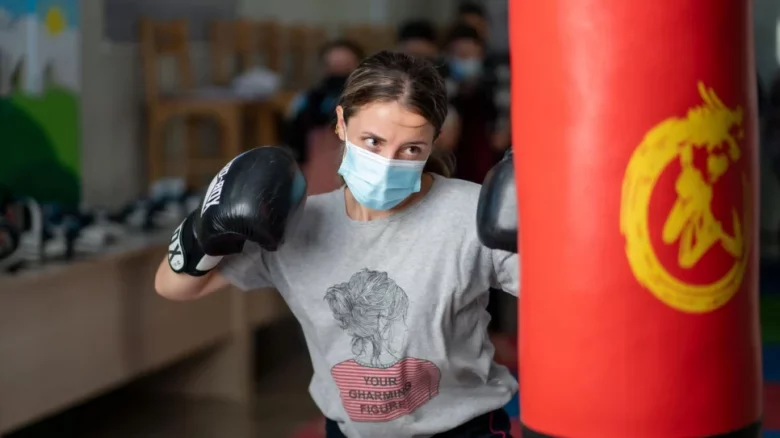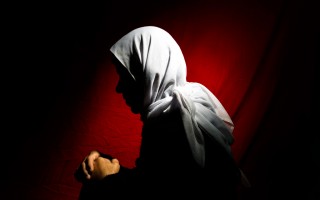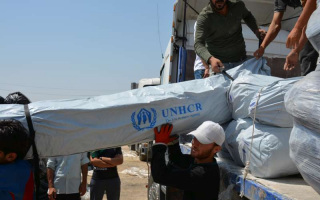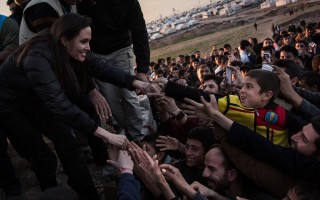
The “Boxing Sister” programme helps displaced women and girls to “kick their grief and pain away”. © UNHCR/Creative Pencils Agency
A boxing project implemented by an NGO Innovation Award winner is empowering displaced Yazidi women and girls in the Kurdistan Region of Iraq.
By Rasheed Hussein Rasheed and Kristy Siegfried
When Nathifa Wadie Qasim was a young girl back in Sinjar, in Iraq’s Nineveh Governorate, her school had a punching bag that was used by male students for boxing practice. Nathifa punched it almost every day.
“I remember I was the only female among my friends who had the courage to get close to that red bag and land some hard punches at it,” she recalls. “It helped me to take my stress out.”
At home, Nathifa was the main carer for her sick mother and younger siblings while her father was out working the family’s fields. Her mother died just days before ISIS militants attacked Sinjar in August 2014. The militants targeted Sinjar’s majority Yazidi population, whose ancient religion draws on both Christianity and Islam, subjecting them to a reign of terror that the UN has called a genocide. Thousands of Yazidi men were executed while women and girls were abducted and often sold into sexual slavery.
Nathifa and her family managed to escape, eventually ending up in Rwanga, a camp for some 12,000 internally displaced people, most of them Yazidis, in the Kurdistan Region of Iraq. Eight years later, they are still there, although Nathifa’s father has since remarried leaving Nathifa, now aged 28, as the sole provider for her four teenage siblings.
The punching bag came back into her life after she began working for The Lotus Flower, a community-based organization that supports internally displaced women and girls in northern Iraq. When she was asked to think of a sports activity for girls in the camp, the one that immediately sprang to Nathifa’s mind was boxing.
“The majority of the women and girls in the camp were ISIS survivors who had trauma as a result of what they had been through in captivity,” she says. “I thought, if those women and girls were physically strong, they might have had a better chance of escaping from ISIS or defending themselves.”
By chance, The Lotus Flower’s founder Taban Shoresh, was thinking along similar lines. Herself a survivor of violence, she had also observed the high levels of trauma among Yazidi women and their need for mental health support, and an outlet for their emotions.
“I met a lot of Yazidi women and girls who were impacted by ISIS,” she says. “I could see the anger and the emotions trapped inside them.
“I thought, what will help rebuild their confidence and bring back that power that was taken away. What sport is there? And it was boxing that just came out.”
In 2018, Taban brought Cathy Brown, a former professional boxer and cognitive behavioural therapist, to Rwanga to train Nathifa and other young women how to box and become trainers themselves.
The “Boxing Sisters” programme was born and since then, Nathifa says she has trained over a hundred girls and women.
During a recent class, around 15 young women don boxing gloves and practise jabs and cross punches with sparring partners as Nathifa shouts instructions.
Shaare Sharaf Sameer, 21, is among them. She has been attending Nathifa’s boxing classes since they started and says she feels bored if a day passes without a class.
“It is very good for our health and psychology,” she says, after taking her turn to high kick a punching bag. “No matter how sad or bored we are, we forget everything as soon as we attend the classes.”
“They used to say that boxing was not for girls.”
Nathifa says that any early resistance from the community to the idea of girls learning to box, fell away once the benefits became clear. “They used to say that boxing was not for girls, but they witnessed that the participants got stronger and there is nothing wrong with it.”
The Boxing Sisters programme is just one of many projects run by The Lotus Flower aimed at empowering Iraqi women and girls affected by conflict to rebuild their lives. They include adult literacy classes, support for women-led small businesses, art therapy and training for women to become mediators and peace defenders.
Taban founded the organization in 2016, two years after leaving her job in London and returning to the Kurdistan Region of Iraq to help respond to the humanitarian crisis unfolding there. She noticed a gap in services to support displaced women.
“The gap was more around having a space where women can heal, learn and grow,” she says. “The men and boys could leave the camps, they could move around freely, but the women and girls, because of social pressures, they couldn’t leave their camps or tents without a reason. So, we created a reason for them to leave.”
This month, The Lotus Flower was one of seven organizations to win UNHCR’s annual NGO Innovation Awards. This year’s winners were all women-led organizations working with refugees, internally displaced people, and their host communities.
Back at Rwanga camp, Nathifa says boxing has helped the girls in her classes “kick their grief and pain away”.
“Now, I feel proud of them. They have become what they and I wanted them to become – strong both physically and psychologically.”
Originally published by UNHCR on 23 June 2022.





